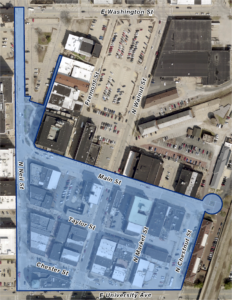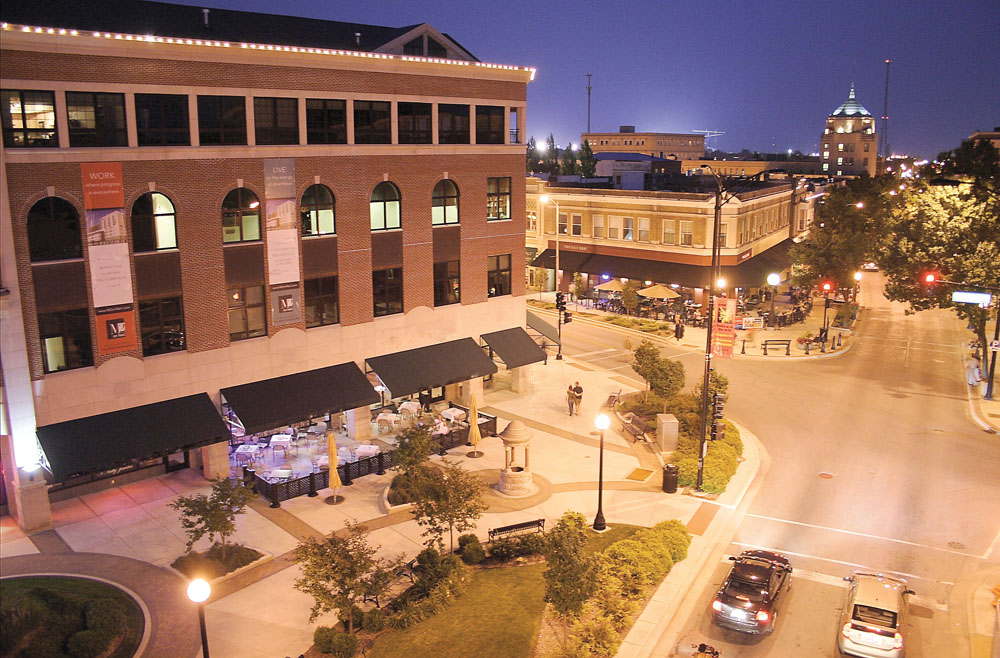Downtown Festival District
A Downtown Festival District allows customers of participating Downtown restaurants and bars to purchase and take open containers of alcohol from the licensed premises for consumption in the public right-of-way located within a designated area and during a limited time frame.
Declared Events
2024 events will be listed soon, along with updated maps.
Designated Area
The designated boundary area of the typical Downtown Festival District is highlighted on the map at right. This map is subject to change with each Downtown Festival District designation.
City Regulations
To learn more about City regulations concerning Downtown Festival Districts, please review City Code section 5-62.2 and Rule 26 in the Rules of the Local Liquor Commissioner.
Frequently Asked Questions
Resident Questions
Liquor Licensee Questions
Yes. Alcoholic beverages sold for public consumption in the Festival District MUST be served in plastic or paper cups. No glass, bottles, or aluminum containers are permitted in the Festival District.
Rule 26 of the Rules of the Local Liquor Commissioner pertains to Downtown Festival Districts, which states:
a. All licensees approved to participate in the Downtown Festival District shall do the following:
1. Conspicuously post, at the bar and at the entrance(s) and exit(s) of the establishment, the associated rules of the Downtown Festival District, as may be updated from time to time by the Liquor Commissioner, in the form distributed by the Liquor Commissioner’s office.
2. Provide a Downtown Festival District wristband to each patron that intends to consume alcoholic beverages outside of the licensed premises.
3. Verify the identity of each patron and confirm that the patron is at least twenty-one years of age before providing a Downtown Festival District wristband to the patron.
4. Provide trash receptacles on the sidewalk areas immediately adjacent to the licensed premises, and regularly monitor and empty these receptacles as reasonably necessary.
5. Assign an employee or employees to regularly inspect for and remove items of trash from the sidewalk, curb, and street areas that are immediately adjacent to the licensed premises.
6. Permit any individual wearing Downtown Festival District wristbands to utilize the establishment’s restrooms, unless so doing would pose an immediate threat or danger to the safety and welfare of the licensee’s employees or customers.
7. Abide, at all times, to all other Rules of the Liquor Commissioner, and to all sections of the Champaign Municipal Code.
b. Additional requirements:
1. No alcoholic liquor may be sold or in any way distributed for consumption in the Downtown Festival District by any person or establishment that has not applied and been approved to participate in the Downtown Festival District pursuant to these rules.
2. No alcoholic liquor intended for consumption outside of the licensed premises may be sold or otherwise distributed to any individual not in possession of a current and valid Downtown Festival District wristband.
3. A licensee may not charge a fee, directly or indirectly, for a Downtown Festival District wristband, which shall be provided by the City.
4. No Class T-2 licenses shall be issued for any portion of the public way that is otherwise part of or adjacent to the area designated as a Downtown Festival District.
5. All alcoholic liquor for consumption in the Downtown Festival District must be contained in plastic or paper cups only.
6. Any licensee that has sold or otherwise distributed alcoholic liquor that is consumed in the public way by an individual who does not possess a required Downtown Festival District wristband, or in a container other than a plastic or paper cup, shall be considered in violation of these rules.
7. In the course of an investigation of a violation of these rules or of the Municipal Code of Champaign, a citizen’s identification of the licensee responsible for such violation shall create a rebuttable presumption of such responsibility. The Liquor Commissioner may rely on such identification if it could be reasonably relied upon by a reasonable person in the course of his or her affairs. Evidence offered for admission to rebut the presumption can include, but not be limited to, photos, videos, and receipts provided by the licensee that prove that the licensee was not responsible for the violation.

